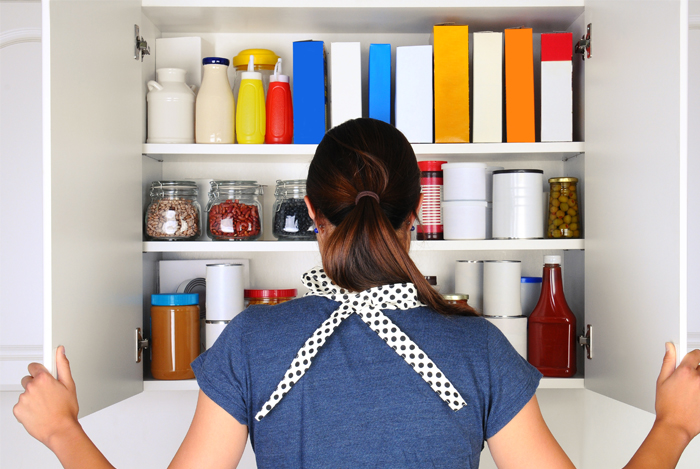Improving your gut health simply can’t be overrated in terms of how it affects your overall body and how much having a healthy gut can improve your health and quality of life.
Why so?
Because your gut is connected directly to your brain and it affects your mood and hormones, not to mention your overall weight and health.
With this in mind, you can see why taking care of your digestive system is one of the most important things you can do for your body and mind.
However, for some people, digestive issues plague them day to day and they don’t know how to correct the issues at hand.
How and Why Gut Health Affects So Many People:
Millions of people suffer from digestive disorders today and it’s no surprise why. When we look at how much our food has changed over the last several decades and see how much stress we’re consistently in throughout a daily basis, it becomes more evident of why gut health issues occur.
Every food and drink choice that we make direct affects our gut health and digestion, not to mention our hormones which then, in turn, affect our digestion too. This cycle makes gut disorders tricky to overcome, but luckily there are some proven nutrition and lifestyle tips that you take note of and implement into your life right now for better digestion and health.
What About OTC Drugs for Digestion?

Over-the-counter supplements can actually hurt your gut health and digestion more than they help. Most all of them contain chemicals and fillers, and even some of the natural digestive supplement options on the market may contain ingredients that don’t agree with your body. (The exception to this rule may be a high-quality probiotic, as you’ll see below, which provides beneficial bacteria to the digestive tract, a must-have for a healthy gut and long-term health.)
With all of these things above in mind, take a look at the following 7 steps you can take right now towards improving your digestion more naturally. Focus on doing them one at a time, in the order listed for the best long-term results, and you’ll notice not only better gut health over time but also better health too.
7 Holistic Steps to Improve Digestion and Gut Health
1. Step One: Remove the Bad

First, you need to purge your diet and pantries of all the foods that don’t support gut health. This includes all junk foods, foods high in saturated fats and trans fats, and all sources of artificial sweeteners and sugar. Artificial sweeteners and sugar have been shown to feed bad bacteria in the body which kills off good bacteria you need for optimal digestion.
Bacteria is the key principle behind good gut health, so it’s in your best interest to do whatever you can to improve the good bacteria content in your gut while removing the harmful bacteria. Removing sugar, processed foods, and artificial sweeteners are three of the best places to start when it comes to getting rid of foods in your diet that feed bad bacteria in the body.
Now let’s talk about prescription drugs.
While you need to talk with your doctor for ultimate advice, you should also do your own research on prescription drugs and gut health.
Studies consistently show that prescription drugs contribute to poor gut health and they kill off healthy bacteria cultures within the body.
There are many holistic options and dietary changes available for you that you may be able to take in order to combat whatever health issues you’re struggling with without you having to take prescription medications to deal with those health issues. (Two great example of this are dietary strategies to manage Type 2 diabetes or high blood pressure levels.)
As always, speak with your doctor before making serious changes in your medication routine(s).
Next, let’s talk about caffeine.
I know you don’t want to hear that coffee can hurt your gut, but the truth is, all sources of caffeine irritate the digestive system. If you’re taking in numerous amounts of caffeine a day, you’ll want to reduce your intake and choose to have green tea or only one cup of coffee instead. Some people have to eliminate it altogether, so test this out to see what works for you.
Overall, removing all the processed foods you eat too much of and fast foods can do wonders to improve your gut health, but sometimes, even removing those aren’t enough. You’ll likely need to focus on whole foods and from there focus on eating foods that digest easily for you and are free of all additives and preservatives. Continue onto the next section to find out foods that are optimal for helping you improve your digestion.
2. Add in the Good:

So now that you’re not eating junk foods and high-fat or high-sugar foods, what should you eat? Now it’s time to fill your diet up with supportive foods and drinks for better digestion and gut health.
Start With Whole Foods:
Whole, clean foods high in fiber, vitamins, minerals, and water are the most important place to start when you build your menu each day. However, if you have digestive issues, taking in too much fiber at one time can actually hurt your digestive system and lead to SIBO, or small intestinal bacterial overgrowth. This is where taking a slow and steady approach to eating healthy and eating more fiber is the key to improving digestion over the long-term.
Vegetables and Greens:
Focus on eating at least one vegetable with each meal, preferably one that’s easy to digest like spinach or zucchini versus those that might be too fibrous at first such as broccoli or Brussels sprouts. Generally, squash, greens and root veggies like carrots digest very well. Include any other vegetables in your diet you enjoy as well.
Vegetables that are especially beneficial to increasing good bacteria levels in the body are:
- Asparagus
- Celery
- Artichokes
- Peppers
- Onions
- Kale
- Spinach
- Squash
Protein:
Next, add in some lean protein from a source of protein that’s low in saturated fats and high in beneficial nutrients. You can choose whichever ones you prefer depending on how you react to them. Fish is usually one that digests easily while other people prefer options such as plain yogurt, lentils, black beans, or eggs. Keep in mind that many people are sensitive to eggs and they may irritate the gut and not be suitable at this time.
Remove large amounts of nuts and seeds at this time, and take notice of how you react to even small quantities of them. While these foods are high in nutrients, they can irritate the gut wall and cause inflammation. To obtain your omega-3’s without nuts and seeds, eat fish or take fish or algae oil.
Healthy Fats:
It’s also important to eat healthy fats that digest easily for you. Some good sources are coconut and coconut oil, fish or fish oil, olives, finely ground flax, and hemp seeds. Healthy fats are a vital part of digestion and nutrient absorption along with a balanced intake of protein and healthy, complex carbohydrates.
Carbohydrates:
When it comes to carbohydrates, choose cooked sources that digest slowly and easily such as:
- Oats
- Sweet potatoes
- Winter squash
- Yellow/gold potatoes
- Beets
- Carrots
- Low Glycemic Fruits from berries, apples, pears, melons, and tomatoes
- Digestive-friendly fruits such as pineapple and cucumber
These will help satiate you, provide the carbs you need for balanced nutrition, and generally, these sources of healthy carbohydrates don’t upset the digestive system or feed bad bacteria levels in the body.
Avoid dried fruits temporarily as you balance out your good gut bacteria levels since they’re more concentrated in sugars and avoid all fruit juices, spreads, and jams right now too. This can be especially useful for combatting digestive issues such as SIBO and candida yeast overgrowth.
Herbs and Roots
Along with whole foods, focus on herbs and roots that can support digestion further. These include peppermint which reduces gas and bloating, ginger which reduces indigestion and nausea, turmeric which supports digestion and liver cleansing, and others like oregano and basil that improve immunity and support healthy bacteria levels within the body.
Filling your diet with supportive foods such as these will help you focus on eating for your digestion versus focusing on what you’re choosing not to eat right now (such as your favorite junk foods, for example).
3. Supplement With Probiotics

As mentioned, probiotics can help increase the levels of healthy bacteria in your gut while also improving digestion and nutrient absorption. Choose one that is dairy and gluten-free for optimal results, and consider taking a digestive enzyme with your probiotic which will help digestion even further.
Enzymes help break down food and fungal walls such as those linked to candida yeast overgrowth. Probiotics help restore healthy bacteria levels while diminishing bad bacteria levels in the body.
Aside from probiotics, you should also focus on eating naturally fermented foods that are high in beneficial bacteria such as kimchi, sauerkraut, kefir, yogurt, and apple cider vinegar. You can even find dairy-free kefir and yogurt if you’re looking to avoid dairy at this time.
Natural, fermented foods will benefit the growth of good cultures you need for optimal digestion and help kill off some of the bad bacteria. Since they can be especially cleansing and detoxifying at first, be prepared that you may go through a slight detox when adding them into your diet, but you should notice better digestion almost immediately upon implementing them into your routine.
4. Get Enough Sleep

One of the most important parts of overcoming digestive struggles is improving your quality of sleep and how much sleep you get. Hormones that directly affect digestion are influenced by how much sleep you get. These hormones include sex hormones, cortisol, leptin, insulin, and serotonin along with melatonin.
When you don’t get enough sleep, you’ll notice your digestion can be just as “off” or just as worse as it is when you are highly stressed out and your hormones are the reason why. Aim to get at least 7-8 hours of sleep each night, but if you need more sleep than that, feel free to get up to 9 or 10 hours of sleep. Listen to your body and let it tell you how much sleep is best for you at this point in your healing journey.
If you have trouble sleeping, supplementing with some magnesium citrate or oxide can be helpful since they can help you sleep. Magnesium supplementation at night can also reduce the risk of constipation although taking too much can lead to tummy troubles. Start small when taking magnesium and give it a try to see if it can help you sleep. You can also take Epsom salt baths to help you get to sleep more easily which are also a natural source of magnesium.
5. Do Some Form of Daily Movement, a.k.a. Exercise!

Your gut is a muscle, therefore, it needs to move just like the rest of your body does each day. Aim to get some sort of movement every single day and you’ll see digestive benefits as a result. The key is to do low-stress exercises when you’re trying to heal your gut, not intensity movements that increase your cortisol levels too much or lead to excessive stress.
Exercises and types of movements that are especially helpful to improving digestion are yoga, walking, light jogging, and jumping on a rebounder. Aim to get at least 30 minutes or 45 minutes of movement each day, even if it’s just some yoga and walking.
It’s also a good idea to do some form of light activity throughout the day versus sitting all day long. Take small breaks if you work at an office or take a walk on your lunch break.
The bottom line? Move your body and your gut will thank you!
6. Don’t Cut Calories Too Low

Low-calorie diets don’t support long-term digestion because they often mean you’re skimping out on important nutrients that benefit your digestion and long-term gut health. When you cut the calories in your diet down to extremely low levels, you can end up downregulating your metabolism and forcing your body to operate in a constant state of stress. Low-calorie diets can even lead to serious health issues such as gallstones or malabsorption of nutrients
Instead of dieting, just aim to eat balanced meals throughout the day, and listen to you hunger levels to determine how hungry you are at each meal. While it’s important not to overeat for optimal gut health, it’s also just as important to eat enough and eat regularly.
One helpful tip that can be helpful to make sure you are prepared and have food on hand for busy schedules is to pre-portion out your meals to make sure you have a balanced intake of protein, carbohydrates, and fats at each meal.
Generally speaking, it’s smart to eat 4-6 ounces of protein per meal with 2 cups of greens or vegetables, ½ cup cooked carbohydrates of your choice, and 1-2 tablespoons of healthy fats. If you want more vegetables or carbohydrates, choose sources from whole, plant foods such as vegetables, fruits, whole grains, or root vegetables and starches versus processed sources.
7. Stay Motivated

Last but not least, stay motivated! Learning to navigate your gut health and improve digestion can be a timely struggle, but it is possible to overcome digestive issues so don’t give up.
You might find it helpful to confide in someone, seek out the help of a nutritionist or naturopath, follow a meal plan, and even keep a digestion and food journal to keep a written record of how all the foods you eat affect you. Be mindful of your stress levels each day and attempt not to eat when you’re stressed. You will also find it more beneficial to note if you have any negative reactions to foods that you could potentially be allergic to. If you need to have allergy tests based on the notes you take, then feel free to do so.
It’s also important to continue to educate yourself on gut health and turn to science versus just relying on hypes and trends you hear around the web. Here are some organizations that may be able to help you further if you’d like more in-depth assistance with gut health.
Each of these things listed above will help you stay motivated towards improving your digestion and prevent you from focusing on the negative aspects of poor gut health.
To learn more about healthy meals that support optimal digestion, you can also take a look at these 16 quick and healthy meal ideas.
The post Heal Your Gut Naturally: A Holistic Approach to Improving Digestion appeared first on Nutrition Secrets.
http://www.nutritionsecrets.com/heal-your-gut-naturally-a-holistic-approach-to-improving-digestion/
No comments:
Post a Comment